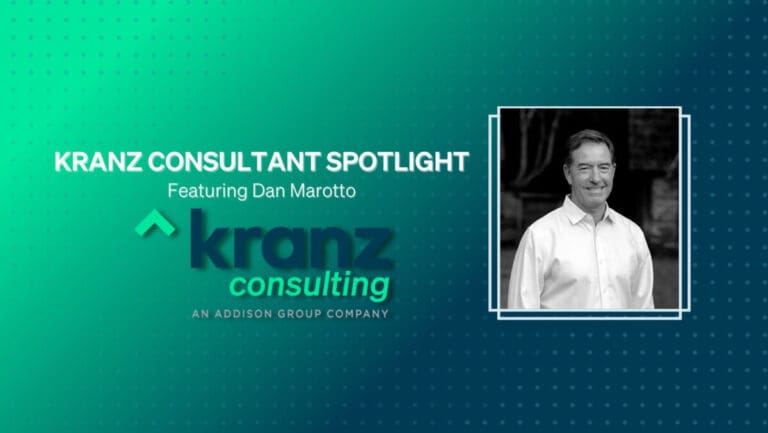
We are thrilled to highlight our CFO, Dan Marotto. Dan has been a valuable part of Kranz Consulting since 2023. Read the full interview to learn more about Dan’s expertise, his passion for his work, and how he helps his clients thrive.
Where did you grow up? I grew up in San Franciso and Marin County, where I live today.
What is your alma mater? I attended the University of California, Davis and Cambridge University earning a Bachelor of Science in Managerial Economics and my California CPA certification.
What are your favorite hobbies? When I am not with my clients, I enjoy spending time with friends riding and skiing on any mountain, watching the San Francisco Giants, golfing and hiking with the family.
How has your background impacted your experience as a consultant? I have held roles as a consultant, CFO, COO, and CEO in fast-moving consumer goods, professional services, and technology companies. This combined experience allows me to look at an opportunity or challenge through multiple lenses – helping the team to develop a path forward. From an operational perspective, I can draw upon my collective experiences to support scaling companies, develop high performing teams, and build strategic plans. At the end of the day, I want to serve the client as a truly trusted partner.
What does a typical workday for you consist of? When I experience the “typical” day, I will update my response! In the CFO advisory role, there is no typical workday, as each day is driven by the profile of our clients, stage of the companies, special projects, and seasonal demands. It is a never-ending learning cycle with really wonderful teams where we have the opportunity to solve problems and contribute every day.
What motivates you to wake up and go to work every day? What motivates me is having the opportunity to make a difference in an early-stage or scaling company, learning something new that I can take and apply to an adjacent sector, building highly effective teams, and supporting and working with a group of innovative and thoughtful clients.
What kind of projects have you been working on at Kranz? Recently, my focus has been on early-stage Web3 and AI companies where we quickly work to create an operational framework that provides management with clear processes to support the management and scale of the business. This starts with the classics requirements: a structured system of record that aligns with measuring progress against the economic model, a detailed budget, and building out tools to support the burn rate and runway analysis. In turn, this supports the fundraising efforts and lends key input for the investors. What I find most rewarding about supporting early-stage companies and their teams is that every day, you have the opportunity to contribute to the decision-making process that propels the company forward.
Where do you believe you deliver the most value to your client? One of the transformative ways to deliver value for a client is to define and implement a workflow that creates the feedback loop between recorded transactions and the budget or plan, which helps the client understand the functionality of their business and make informed decisions. During this process, you really get the opportunity to learn the business, work with the team, and earn their trust – which becomes a great asset all to its own.
How do you organize environments with a lack of reporting infrastructure or inefficiency? As a CFO and COO, I have led several projects with early-stage ventures and found that they all suffered from the same core symptom: a complete disconnect between data residing in the company tech stack and what is recorded in the system of record. This was the result of a lack of operational structure, data organization without intent, and compounded with an unstructured reporting environment. The remedy is tedious, but the formula is consistent: 1) focus on process (inputs are critical), 2) capture the transaction consistently, timely, and accurately, and 3) eliminate the manual transactions (the data is in the tech stack). Once management understands that the data and the reporting will not only support day-to-day informed decision making but will also be leveraged to validate the path forward – three-year plans are not only aspirational but become attainable with a clear path. I find that once the team sees the benefits firsthand, everyone gets on board and the process takes off.
